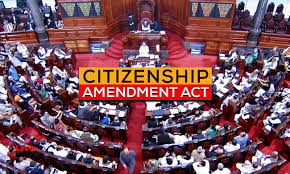What are the short and medium-term implications?
A confrontationist polity? Agri economic slowdown?
Yes, the many critical sectors, agriculture, rural India and the generation of employment for the youth etc are all giving a sense of uncertainty. This is not good. We need to speedily cultivate a collective sense of solidarity, a sense of reconciliation and a new hope and optimism all around.

As we write the country is driven by widespread protests over two legislations passed by Parliament. One is the National Register of Citizens (NRC).The other is the Citizens Amendment Act (CAA). The story behind these two Acts needn’t detain us here.
As we write the TV screens are screaming with gory scenes of popular protests all over India, and mass violence in all the major cities. This sort of protests we have not seen for a very long time. May be this sort of popular unrest must have been there in the 1975 declaration of the Emergency by Indira Gandhi.
Any such widespread agitations often lead to fundamental changes in the polity as well. Even the Mandal Commission Report led to V.P.Singh’s short-lived regime. Many such agitations as the one in 1965 in TN over the Hindi imposition led to a complete change of political history with the advent of the Dravidian politics and an end to the progressive regime of the Kamaraj era.
As things stand these are only the beginning. What the future holds for India’s polity and economy? Both the Prime Minister and the Home Minister have not yet come out with their reactions. The other functionaries of the government are not visible and not speaking out. As commentators have written there is fear and insecurity in the air. Except the top two leaders no other ministers seem to have any standing in the hierarchy of the power structure. Already, the last many years after the Modi government came into existence in 2014, there have been radical changes in the governance style. Many institutions like the police, judiciary and the media, why even in the working of the major institutions like the Cabinet and other ministries there have been changes, not all to the greater good of the public in the conduct of the persons and the power wielders.
Unfortunately, in all these years we were given lots of promises and hopes for so many changes. But at the end of these long years what we have been faced with is the unexpected economic slowdown, the worst in many years.
This economic slowdown, it seems, a very long one. Not many, the experts and bureaucrats, those in such organizations like the NITI AAYOG, are speaking out and shedding any light.
It is these key experts who must be forthcoming to give hope and light to the general public.
As a senior journalist has put it (The Hindu, 20.12.2019) the Prime Ministers stands tall over all his colleagues and no one in his Cabinet don’t seem dare to open his mouth!
Yes, it looks like that and is a sad state of affairs to see the country of such a large size is finding itself none other than the PM, has to take the initiative. How much destruction of public property we have to still endure before the explosive situation can be brought under control?
Apart from all other considerations it is a sad development that no one could foresee for what has happened so far and when will the situation can be brought to a positive solution.
Is this the right time to talk of specific problems of critical sectors like agriculture, rural India, youth and the corporate issues on which depend the growth of the economy?
No, it seems that the public are confused and wonder what will be the future shape of the polity.
In a recent book(The People Vs Democracy by Yascha mounk, a Harvard economist and political theorist has brought out some of the similar recent trends in some other countries, some democracies, some dictatorship of the new varieties like Turkey, Hungary and the reviewer names the Indian Prime Minister too, that these newly elected leaders and also
the newly found enthusiasm for ‘imposing’ popular polices in an undemocratic fashion, a sort of illiberal institutions and authoritarian style governance. Such of these countries and their leaders have also won some widespread praise from foreign government and leaders. As Mr.Modi has liberally earned all through his tireless travels and participation in international summits.
But suddenly hs is caught in unforeseen unfavorable reactions, as from the USA and neighbours like Bangladesh and may be very soon even from far-off countries too.
Already, countries from the European Union, the ones like Finland, Sweden and others who have spoken out on our stand on J&K, we might expect newer criticisms over what the Western nations see as Human Rights violations.
Given current subdued tone of domestic criticism, we shouldn’t be complacent to remain immune what possible fall-out our current predicament might take us to.The point here is that India is after all a mature democracy, for 73 years we have practiced democratic politics, our electoral practices have won universal praise. So too our international policies on many issues.
Our economic strength is fine. But the new challenges on trade issues, especially the agricultural trade policies we have to become more open-minded and we have to become a more dynamic agricultural economy and a participant in multi-lateral trade policies.
We have to co-operate and become worthy partner in more progressive agricultural trade participant.
For all these dreams and hopes fructify we need a more open debate on our basic issues. Religion and communalism, India has a vast territory to traverse and we need to collect more talents in the governing elite. A democracy calls for a new sense of shared values, even an ideological consensus. Consensus-building is the democratic ideal, at all times, let us know.